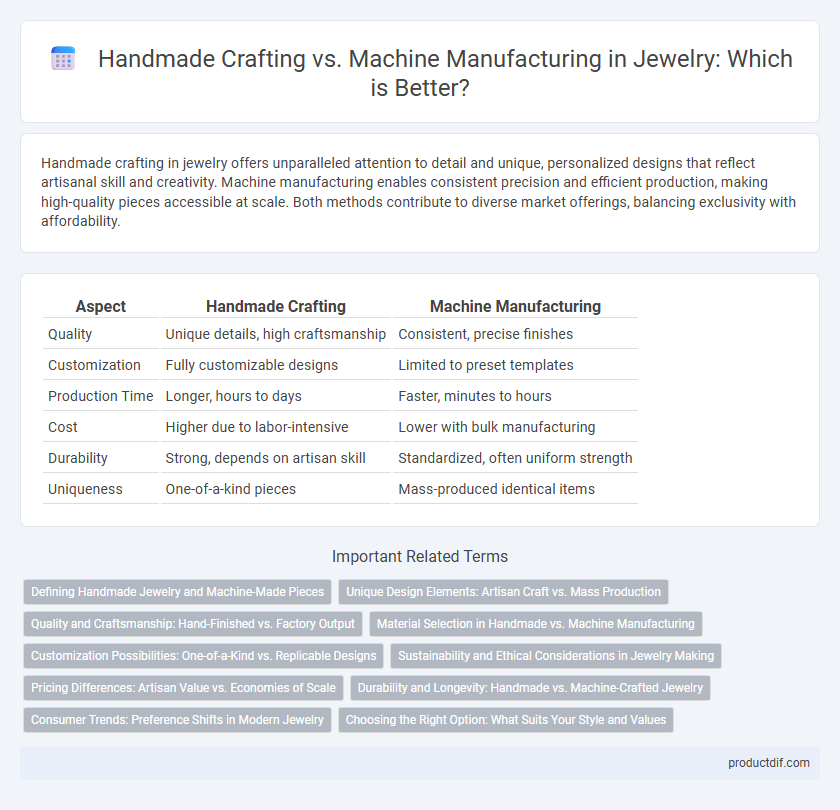Handmade crafting in jewelry offers unparalleled attention to detail and unique, personalized designs that reflect artisanal skill and creativity. Machine manufacturing enables consistent precision and efficient production, making high-quality pieces accessible at scale. Both methods contribute to diverse market offerings, balancing exclusivity with affordability.
Table of Comparison
| Aspect | Handmade Crafting | Machine Manufacturing |
|---|---|---|
| Quality | Unique details, high craftsmanship | Consistent, precise finishes |
| Customization | Fully customizable designs | Limited to preset templates |
| Production Time | Longer, hours to days | Faster, minutes to hours |
| Cost | Higher due to labor-intensive | Lower with bulk manufacturing |
| Durability | Strong, depends on artisan skill | Standardized, often uniform strength |
| Uniqueness | One-of-a-kind pieces | Mass-produced identical items |
Defining Handmade Jewelry and Machine-Made Pieces
Handmade jewelry is crafted individually by skilled artisans using traditional techniques, emphasizing unique designs and intricate details that reflect personal craftsmanship. Machine-made pieces are produced through automated processes, allowing for high precision, uniformity, and large-scale manufacturing efficiency. The distinction lies in the tactile artistry and customization inherent in handmade items versus the consistency and speed enabled by machine manufacturing.
Unique Design Elements: Artisan Craft vs. Mass Production
Handmade jewelry showcases unique design elements crafted by skilled artisans, highlighting intricate details and personalized touches that machines cannot replicate. Machine manufacturing allows for consistent quality and high volume but often lacks the individuality and subtle variations found in handcrafted pieces. Consumers seeking exclusive, one-of-a-kind accessories prioritize artisan craft over mass-produced jewelry.
Quality and Craftsmanship: Hand-Finished vs. Factory Output
Handmade jewelry showcases unparalleled craftsmanship, with artisans meticulously shaping each piece to ensure unique details and superior quality control. Machine manufacturing offers consistent, high-volume production but often lacks the nuanced artistry and personalized touch found in hand-finished items. The distinct value of handmade jewelry lies in the precision, creativity, and attention to detail that mass-produced factory output typically cannot replicate.
Material Selection in Handmade vs. Machine Manufacturing
Handmade jewelry often features carefully selected, high-quality materials such as ethically sourced gemstones and precious metals, ensuring unique character and durability. In contrast, machine manufacturing prioritizes consistency and cost-efficiency, frequently utilizing standardized materials that allow for mass production but may lack the bespoke qualities of artisan-crafted pieces. The choice of materials in handmade crafting directly impacts the jewelry's aesthetic richness and value, while machine manufacturing focuses on uniformity and scalability.
Customization Possibilities: One-of-a-Kind vs. Replicable Designs
Handmade jewelry offers unparalleled customization possibilities, as artisans can create one-of-a-kind pieces tailored to individual preferences, ensuring unique design elements and intricate details not found in mass-produced items. Machine manufacturing excels in replicating consistent designs with precision, enabling efficient production of large quantities but limiting the scope for personalized modifications. Consumers seeking exclusive, bespoke jewelry often prefer handmade crafting for its ability to incorporate distinct artistic nuances that machines cannot replicate.
Sustainability and Ethical Considerations in Jewelry Making
Handmade crafting in jewelry often ensures greater sustainability through the use of ethically sourced materials and reduced energy consumption compared to machine manufacturing. Artisans can selectively choose recycled metals and conflict-free gemstones, minimizing environmental impact and supporting fair labor practices. Machine manufacturing, while efficient, frequently relies on mass production methods that may compromise ethical standards and contribute to higher carbon footprints.
Pricing Differences: Artisan Value vs. Economies of Scale
Handmade jewelry often commands higher prices due to the unique artisan value, intricate craftsmanship, and time-intensive processes, making each piece one-of-a-kind. Machine manufacturing leverages economies of scale to produce jewelry at lower costs, enabling mass production and consistent quality but often at the expense of individuality. Pricing differences reflect the balance between exclusivity and affordability, with handmade pieces appealing to consumers seeking personalized artistry and machine-made jewelry attracting those prioritizing budget-friendly options.
Durability and Longevity: Handmade vs. Machine-Crafted Jewelry
Handmade jewelry often exhibits superior durability due to meticulous craftsmanship and the use of high-quality materials that are carefully selected and tested by artisans. Machine-crafted jewelry, while consistent in precision and design, may lack the personalized attention to detail that enhances longevity and resistance to wear. Artisanal techniques contribute to stronger structural integrity, ensuring that handmade pieces maintain their beauty and function over extended periods compared to mass-produced counterparts.
Consumer Trends: Preference Shifts in Modern Jewelry
Consumers increasingly favor handmade jewelry for its unique artistry and personalized touch, valuing the craftsmanship and story behind each piece. Machine manufacturing offers precision and affordability, appealing to buyers seeking consistency and modern designs at scale. Current trends indicate a growing desire for sustainable and ethically crafted jewelry, driving demand toward artisanal creations over mass-produced items.
Choosing the Right Option: What Suits Your Style and Values
Handmade jewelry offers unique, artisanal designs with attention to detail, ideal for those valuing craftsmanship and individuality. Machine manufacturing provides consistent quality and affordability, suitable for customers seeking precision and mass-produced styles. Selecting between handmade crafting and machine manufacturing depends on personal style preferences and ethical considerations such as sustainability and support for local artisans.
Handmade Crafting vs Machine Manufacturing Infographic

 productdif.com
productdif.com